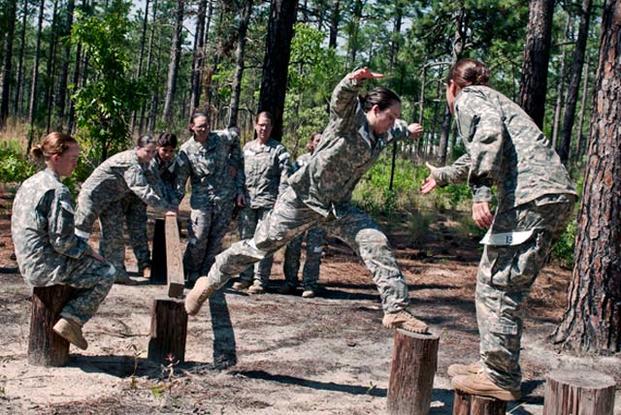Ten female lieutenants completed the first step in becoming U.S. Army infantry platoon leaders on Wednesday by graduating from the first gender-integrated class of Infantry Officer Basic Leader Course.
Twelve women started the 17-week course at Fort Benning, Georgia, and 10 met the standards to graduate alongside 156 male classmates.
"The training of an infantry lieutenant is a process until they step in front of that rifle platoon, and this is but the very first step in that process," Lt. Col. Matthew Weber, battalion commander of the course, told reporters Wednesday at Fort Benning. "It's a critical one because we are very much focused on training and preparing the soldiers, the lieutenants, to ultimately lead a rifle platoon."
The graduation of first 10 women from the infantry course comes a little more than a year after Capt. Kristen Griest and 1st Lt. Shaye Haver became the first women to graduate Army Ranger School in August 2015. Maj. Lisa A. Jaster became the third woman to graduate from a gender-integrated Ranger course two months later.
Defense Secretary Ash Carter in December ordered all military jobs, including special operations, opened to women. His directive followed a 2013 Pentagon order that the military services open all positions to women by early 2016.
Army officials maintain that it hasn't taken long for gender integration to become the norm in training.
"We have been integrating women into the military for years; they have fought and bled beside us for years," said Maj. Gen. Eric Wesley, commanding general of the Maneuver Center of Excellence at Fort Benning. "This is an important moment, but this is something that is in many ways business as usual."
Fort Benning officials would not release the names of the 10 female graduates. Their next stop is Ranger School, Weber said.
Then, whether they are successful or not, they will go into other courses, including Airborne School, Striker Leader Course and then Mechanized Leader Course -- a process that will take about a year to complete.
"Once they have completed all those courses, then we will have deemed them fit to lead whatever type formation out in [Forces Command] and they will depart Fort Benning," Weber said.
Female infantry officers will leave Fort Benning and go to Fort Hood, Texas, and Fort Bragg, North Carolina, Wesley said.
Army Chief of Staff Gen. Mark Milley has directed that gender-integration first focus on leaders at those two installations, Wesley said.
"We are priming the pump and enabling success by initially focusing on two installations and then ultimately they will start to migrate out to other installations," he said.
Griest and Haver are following the same path.
Griest, a military police officer from Connecticut, was granted transfer to the infantry branch April 25, 2016. Haver, an AH-64 Apache helicopter pilot from Arizona, has been approved to transfer into the infantry, and "we are still awaiting final word on when that is going to come down," said Brig. Gen. Peter Jones, commandant of the Infantry School.
"Upfront, I will tell you this makes us a better Army and the reason it makes us a better Army is that this whole issue has driven us -- it has been a forcing function, to ensure that we had the right standards aligned to each occupational specialty in the Army," Wesley said.
Establishing gender-neutral standards has been the "culmination of two years of different work done by Training and Doctrine Command, with physical scientists looking at what is the physiology of moving weight and what is the difference between infantrymen and field artillerymen?" Jones said.
"We have the scientific data that shows these are the propensity skills that you have to do and the physiology to do those."
Benning officials maintain that gender integration has not lowered standards.
"There has been no change in the standards," said Infantry Officer Basic Leader Course Command Sgt. Major Joe Davis. "There is no change in the course ... we are in the business of producing leaders. It doesn't matter if they are male or females."
-- Matthew Cox can be reached at matthew.cox@military.com.
Related Video:
Two Minute Brief: Women in the U.S. Military





























